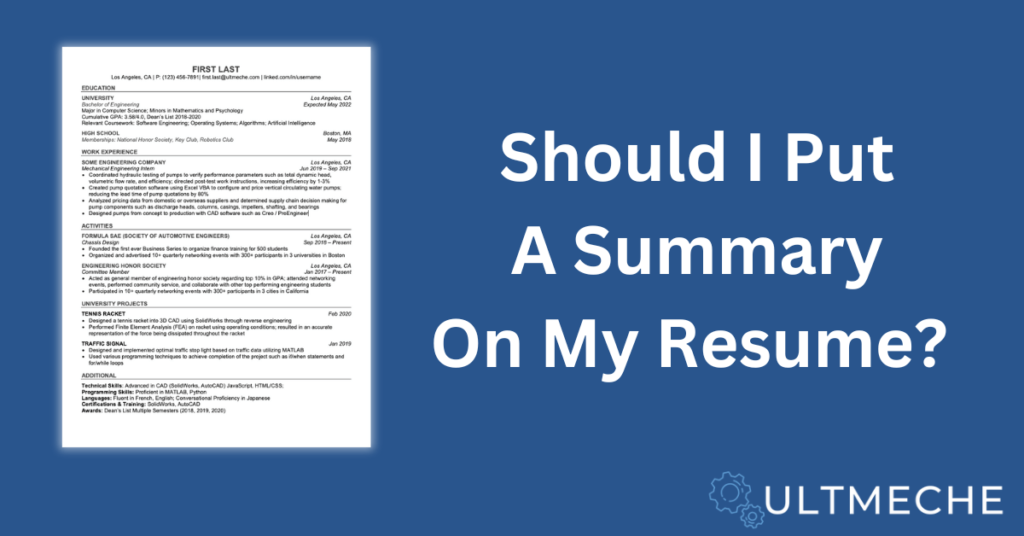It’s a big question when it comes to finalizing an application – should I put a summary on my resume?
The short answer is, probably, but the long answer requires a bit more work before you get to actually writing one.
September 1, 2024
Why Is A Resume Important?
When you first apply for a role, a resume is what sets you apart from other candidates. It provides your potential employers with an overview of you, your skill set, and, crucially, serves as their very first impression of how it might look if you worked for their business.
This first impression is particularly crucial. From the very start of your resume, you need to have an impact. This is where a resume summary comes in.
Optimizing Your Resume For The Right People
When you begin to write your resume, it’s important that you have the right reader in mind. This can influence the language and format you use throughout.
For example, if the recruiter is using an applicant tracking system (ATS), then the use of keywords throughout your resume becomes even more important. Many recruiters scan hundreds of resumes for high-paying roles, and many applications will pass through a system before they’re seen by a person. An ATS will highlight key words and phrases that a resume has in common with the job description and help recruiters to pick out the best applicants.
To be sure your resume reaches the right people and to ensure the summary on your resume has its intended impact, you need to rewrite and optimize your resume for the right audience.
Should I Put a Summary On My Resume?
The question should I put a summary on my resume is one that often sparks debate among recruiters and professional resume writers. It has pros and cons that are important to consider.
Firstly, it has an immediate impact, and this is perhaps the greatest benefit of a resume summary. It provides the perfect opportunity for a clear and thoughtfully crafted introduction into the rest of the resume. For applicants this provides an opportunity to highlight significant achievements, and for recruiters it allows them to see the very best achievements immediately.
A resume summary can be perfect for those who are less experienced or are taking a jump to a more senior position. It can help to highlight potential and express a candidate’s ambitions in the industry.
In some cases, a summary might not be necessary and, if it’s too generic, it can actually take attention away from important details. Particularly in fields that are very technical, employers will often be more interested in the hard skills that an applicant possesses.
What Should A Resume Include?
A good resume will generally include a few essential sections, relevant keywords, and be presented in a professional manner.
Here are just a few key sections to include in your resume:
- Contact Information – This is a practical and essential addition to your resume. Provide your name, email address, phone number and location. This helps recruiters and potential employers know how to get in contact with you.
- Resume Objective or Summary – Your resume summary or resume objective is a brief statement at the start of your CV. It provides an overall view and is the perfect opportunity to make a good first impression.
- Work Experience – Your work experience is an essential inclusion to help recruiters assess your suitability. In this section be sure to include examples of the impact you have made in your previous roles.
- Education – Generally, roles will have education requirements. Be sure to check the job listing and include anything relevant that matches.
- Skills – Your skills help employers to determine whether you can handle the job. Again, be sure to check the job description for any skills the recruiter has highlighted as essential.
- Certifications or Awards (if applicable) – For the most part, if you have any industry specific awards or certifications it’s important to include them to help recruiters see the full picture and properly assess your skills.
- Optional sections like volunteer work, publications, or hobbies – As well as skills, many businesses are looking at the person behind the resume. It can be a good idea to show who you are as a person for certain industries.
Need more help perfecting your resume? Get a professional review.
What Should I Put In My Resume Summary?
Finally, crafting the perfect resume summary is a bit of an art, and can take some practice to perfect.
Here are some tips for getting it right for your next job application.
- Personalize the summary. The summary you write should be customized for each role you apply for. Every job and every business is different. You should try and present the ideal applicant for the specific role you are applying for.
- Be concise. Your resume summary should never be a lengthy paragraph that detracts from the rest of the information you present in your resume. Try to keep your summary to a few lines that explicitly present the highlights of your resume in a succinct and clear way.
- Avoid cliches. The truth is that there are buzzwords that every applicant will have on their resume. Saying you’re a “team player” has lost the impact it once had. Try and use this to your advantage and stand out with the wording you choose. Remember to include relevant keywords that highlight your successes.
- Stay professional. The tone of your resume summary will likely be dictated by the industry that you’re applying for. It is, however, always best to stay professional in your language and grammar for a resume summary.
Perfecting Your Resume
With this in mind, you should feel confident in writing your resume summary and landing that dream role. If you need any help with making it absolutely perfect, take a look at the resume review service that’s previously helped 100s of applicants worldwide compete with the top 1% of applicants.
Find more ways to perfect your next application.
Why you shouldn’t include a professional summary on your resume
Rather than reading a professional summary, recruiters and hiring managers may be more pressed to see previous employment. They may want to be more interested in the companies you worked at and the job titles you held. Sometimes this provides more info rather than a professional summary.
Closing Thoughts
There is a lot of nuance associated with whether to include a professional summary or not. In short, I recommend a professional summary when a description of your experience is needed. This is usually for our clients with decades of experience. Usually, my client resumes are straight forward such that it is not needed to add a professional summary. The professional summary then becomes redundant.
Normally recruiters and hiring managers really quickly. They will look at most recent employment, job title, and quickly scan education and skills. Reading the professional summary does not give recruiters or hiring managers a good idea of your past experience if they’re pressed for time. It is more efficient for recruiters to look at previous employment. (Some may even call it the “F” method – as they review the resume template in an “F” like shape)
Results vary.
About the author

Kazuyoshi Fujimoto, PE
Founder | Engineering Career Coach | Principal Mechanical Engineer
Kazu oversees all of ultmeche’s engineering services. He provides consulting such as resume reviews, rewrites, mock interviews, and all services career related. Additionally, Kazu performs consulting work regarding Oil & Gas, Automotive, and Aerospace & Defense. Kazu is licensed as a professional engineer in the state of California and has 9+ years of experience in Oil & Gas, Automotive, and Aerospace & Defense.

6 thoughts on “Should I Put a Summary On My Resume?”